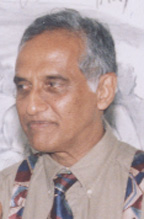Ramkarran sits in the hierarchy of the ruling party and this statement which was made during a recent appearance on Christopher Ram’s ‘Plain Talk’ television programme confirmed what observers had previously suggested, that the central executive of the party was displeased when Chandarpal was relieved of his post resulting in strained relations between the Office of the President and Freedom House.
The Chandarpal dismissal was previously given lip-service treatment from party and government officials, but Ramkarran said he was disappointed that the party was not consulted in the matter. “I am disappointed because another way could have been found.” He said Chandarpal was humiliated following the dismissal.
Consultations on the issue would have likely resulted in “a way out” that would have satisfied both parties, according to Ramkarran. He disclosed that the issue was discussed in the presence of the President on three occasions where critical remarks were made; he was present at one meeting. He admitted that there was no specific outcome.
Initially, he suggested that Ram direct questions on the issue to the President since he had been Chandarpal’s employer, but he was forced to comment after Ram persistently fired off questions. Ramkarran referred to Chandarpal as a tremendous stalwart who gave up a “very promising” academic career to devote his efforts to the political upliftment of the country through his involvement with the party.

Ramkarran asserted that had the issue been before him he would have taken the matter to the party and offered Chandarpal the option of resigning. “He handled it in his style which he defines himself,” he said of the President, adding that he would not go as far as to say that the President was wrong.
Ramkarran’s interview with Ram was widely believed to have been an initial step in his campaign for consideration as the party’s presidential nominee, but while he was firm on a few issues, several others were treated lightly such as presidential assent to bills. Issues of corruption and nepotism were also raised by Ram and Ramkarran skirted them saying he subscribes to the theory that a Freedom of Information (FOA) Bill is among the critical pieces of legislation which is needed in the country, but he stumbled in his response on why the bill is yet to be tabled even after the President had promised to have it in Parliament last year.
Taxes
Ramkarran said he believed Guyanese were heavily taxed, but was also of the opinion that VAT being a “consumption tax” was debatable when the discussion entered the realm of taxes. In terms of relief, he suggested that the percentage of taxes could be reduced for the lower paid workers and an the income tax threshold increased. He added that the government has not been able to get this done, saying he hoped it would be possible in the future. Ram suggested that the tax burden was immoral for a government which prided itself on being working class, but Ramkarran disagreed.
He mentioned also that the PPP was against corruption and would like to see measures adopted that would reduce and bring an end to corruption. He insisted, after Ram pressed the issue, that the party did not discuss government issues “except in a very broad scope.”
Ideology
Ram enquired whether Marxism/Leninism was an ideology Ramkarran supported and he responded by saying that his political growth had been heavily influenced by it. He referred to Marx’s analysis of classes in society, adding that he continued to believe in the socialist worker’s revolution. Pressed on whether the party was pursuing a Marxist ideology, he said belief and pursuit were two different things. “We are not pursuing socialism in the sense that you mean…” Ramkarran said. He insisted that the party had not abandoned its goal in keeping with the ideology.
He said people like him, on the left, had been reassessing their ideology, what it meant and how it was to be applied. Ramkarran contended the PPP had always been “liberal democrat.” Ram challenged him on this and he pointed to free and fair elections saying the party had fought for this. However, Ram informed him that his example represented a single element of democracy before raising the issue of democratic centralism and how alive the Leninist principle was in the policies of the party.
“…Sure it is in the constitution and the party operates on what it sees as the principle of democratic centralism, but that doesn’t mean there is an absence of democracy in the party,” Ramkarran continued. He said delegates of the party voted for the principle and asserted that it could be changed at any time.
A Ramkarran presidency
Asked whether a Ramkarran presidency would look any different from what currently prevails, he said his government would strive to obey all laws and regulations which were passed by the National Assembly. He said sanctions would be applied if the laws were not honoured, but noted that sometimes things were not physically possible. The public must be kept informed on why certain things were not being done.
The interview with Ram also touched on the powers of an executive president and whether changes should be made; how the PPP party had changed since the demise of the Jagans and the 2010 national budget.





